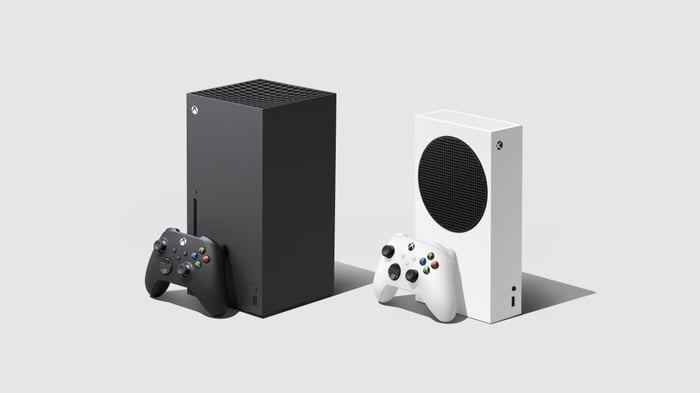Microsoft's (MSFT 1.82%) stock has generated a total return of more than 400% over the past five years, thanks to CEO Satya Nadella's "mobile first, cloud first" strategy. Under Nadella, who took the helm in 2014, Microsoft expanded its cloud services, integrated them into Windows 10, launched new mobile apps on iOS and Android, introduced new Surface devices, and grew its Xbox gaming ecosystem.
Those efforts turned Microsoft, which had often been dismissed as a mature tech stock, into an exciting growth stock again. It also rallied more than 50% over the past 12 months as it brushed off the trade war, COVID-19, and other macro headwinds. Investors might be reluctant to buy Microsoft's stock at these levels, but I believe it could still head higher through the end of the year, for four simple reasons.

Image source: MIcrosoft.
1. Its commercial cloud revenue is expanding
Microsoft's "commercial cloud" revenue rose 36% to over $50 billion, more than a third of its top line, in fiscal 2020 (which ended on June 30). That business includes Office 365, the cloud-based versions of its productivity software; its CRM (customer relationship management) platform Dynamics; and its cloud infrastructure platform Azure.
Azure, which grew its revenue year-over-year at an average rate of nearly 60% over the past four quarters, is the segment's core growth engine. Microsoft doesn't disclose Azure's exact revenue, but Canalys estimates it controlled 20% of the cloud infrastructure market in the second quarter of 2020 -- putting it in second place after Amazon (AMZN 3.43%) Web Services' (AWS) 31% share.
Azure could still have plenty of room to run, for three reasons. First, companies that compete against Amazon, particularly retailers, will likely use Azure instead of feeding Amazon's most profitable business. Second, Microsoft recently beat Amazon to secure the Pentagon's lucrative $10 billion JEDI (Joint Enterprise Defense Infrastructure) contract for upgrading its cloud infrastructure -- which could open the door for more government contracts.
Lastly, the broader cloud infrastructure market will keep expanding as people use more cloud-based services, apps, and streaming services. Grand View Research estimates the global cloud computing market could still grow at a compound annual growth rate of 14.9% between 2020 and 2027.
2. The Xbox Series S and X are about to launch
Microsoft will launch its next-gen Xbox gaming consoles, the Series X and Series S, next month. The Series X will cost $500, while the cheaper, less powerful, and all-digital Series S will cost $300.
Sony's (SONY -0.13%) PS5 will cost the same as the Series X, but its all-digital PS5 Digital Edition (which sports the same hardware as its bigger brother) will cost $400. Microsoft's Series S will be less powerful than the PS5 Digital Edition, but the $100 difference could win over more casual gamers.
Microsoft also recently purchased ZeniMax, which owns iconic franchises like Doom, Fallout, Wolfenstein, and The Elder Scrolls, for $7.5 billion to strengthen its game publishing division and counter Sony's exclusive games. Microsoft is already bundling ZeniMax's games with its Xbox Game Pass subscription service (which offers unlimited downloads from a library of over 100 games), Xbox Live, and Project xCloud with its new "Xbox Game Pass Ultimate" subscription plan for $15 a month.

Image source: Microsoft.
If those aggressive efforts bear fruit, Microsoft's gaming business, which grew its revenue 2% to $11.6 billion and accounted for 8% of its top line last year, could become a major growth engine again in fiscal 2021.
3. The PC market is still strong
Worldwide shipments of PCs rose 13% year-over-year in the third quarter and marked the industry's strongest growth in a decade, according to Canalys. That expansion was largely attributed to a shift to remote work and online learning throughout the COVID-19 crisis.
Rising PC sales will bolster Microsoft's Windows business, which generated 16% of its sales last year, as well as its Office and other products business, which generated 25% of its sales. The growth of those two core businesses, along with the strength of its cloud and gaming segments, should offset the impact of the pandemic on its enterprise-oriented businesses.
4. Its premium valuation is justified
Wall Street expects Microsoft's revenue and earnings to rise by 10% and 12%, respectively, this year. Those are stable growth rates, but some investors might flinch at the stock's forward P/E ratio of 33. That valuation isn't cheap, and its forward dividend yield of 1% doesn't offer much downside protection.
Nonetheless, I believe Microsoft's resilience throughout the pandemic, the ongoing growth of its commercial cloud business, and its upcoming gaming tailwinds all justify that slight premium. In short, investors who accumulate the stock today could be sitting on decent gains next year.





